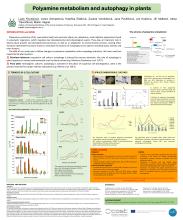Polyamines putrescine (Put), spermidine (Spd), and spermine (Spm) are ubiquitous, small aliphatic polycations found in eukaryotic organisms, which regulate vital developmental and physiological events. They play an important role in diverse plant growth and developmental processes and adaptation to environmental stresses. Among other functions, spermidine stimulates the process of autophagy across species including yeast, animals, and even humans.
Our study aimed to follow changes in polyamine metabolism after autophagy induction. We have used two experimental plant systems.
1) Nicotiana tabaccum suspension cell culture: autophagy is induced by sucrose starvation. The essential role of autophagy in plant response to various environmental cues has been proved (e.g. Masclaux-Daubresse et al. 2017).
2) Picea abies embryogenic cultures: autophagy is activated in the phase of suspensor cell disintegration, which is a process essential for proper embryo maturation (e.g. Minina et al. 2013).
Typ publikace
Datum vydání

